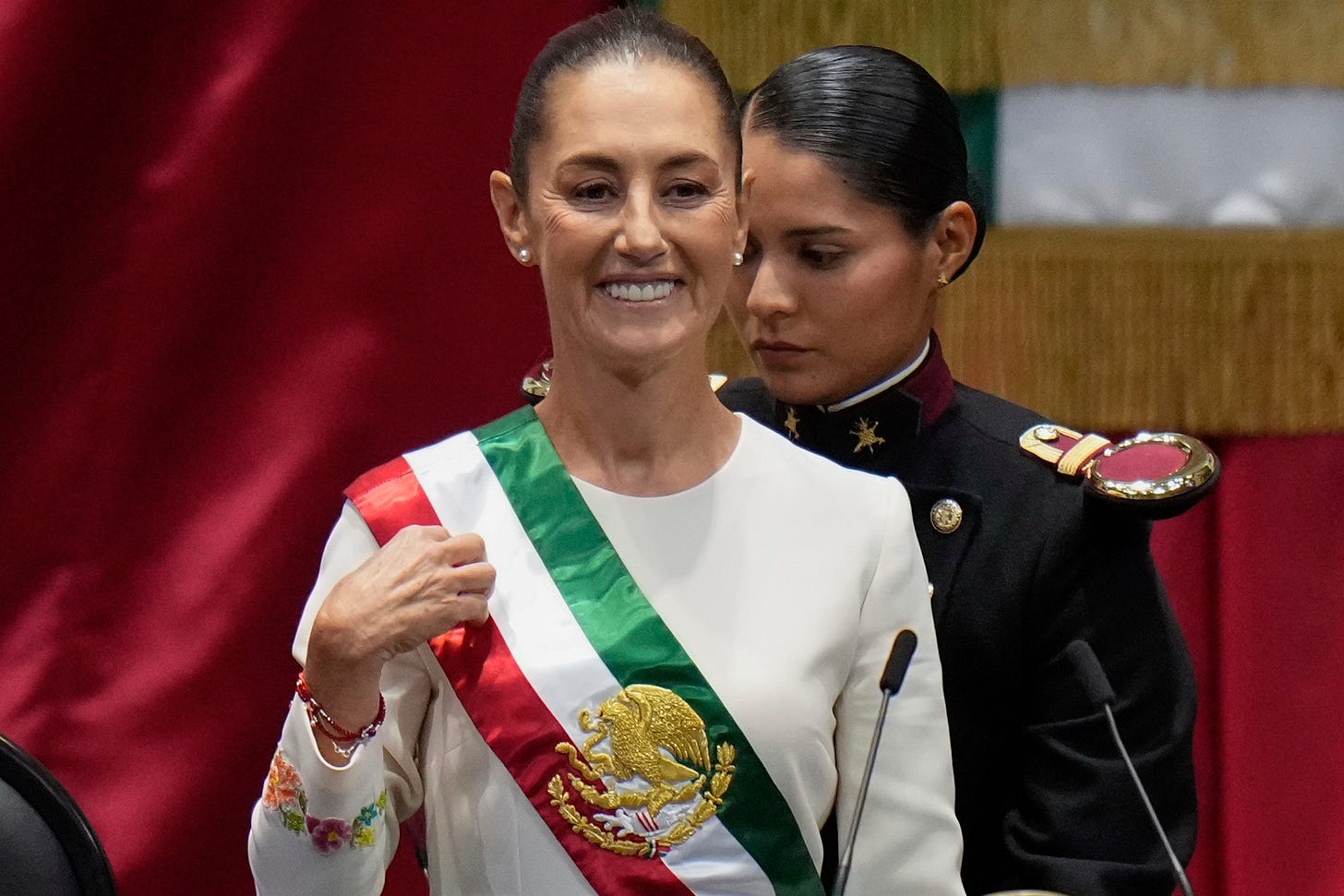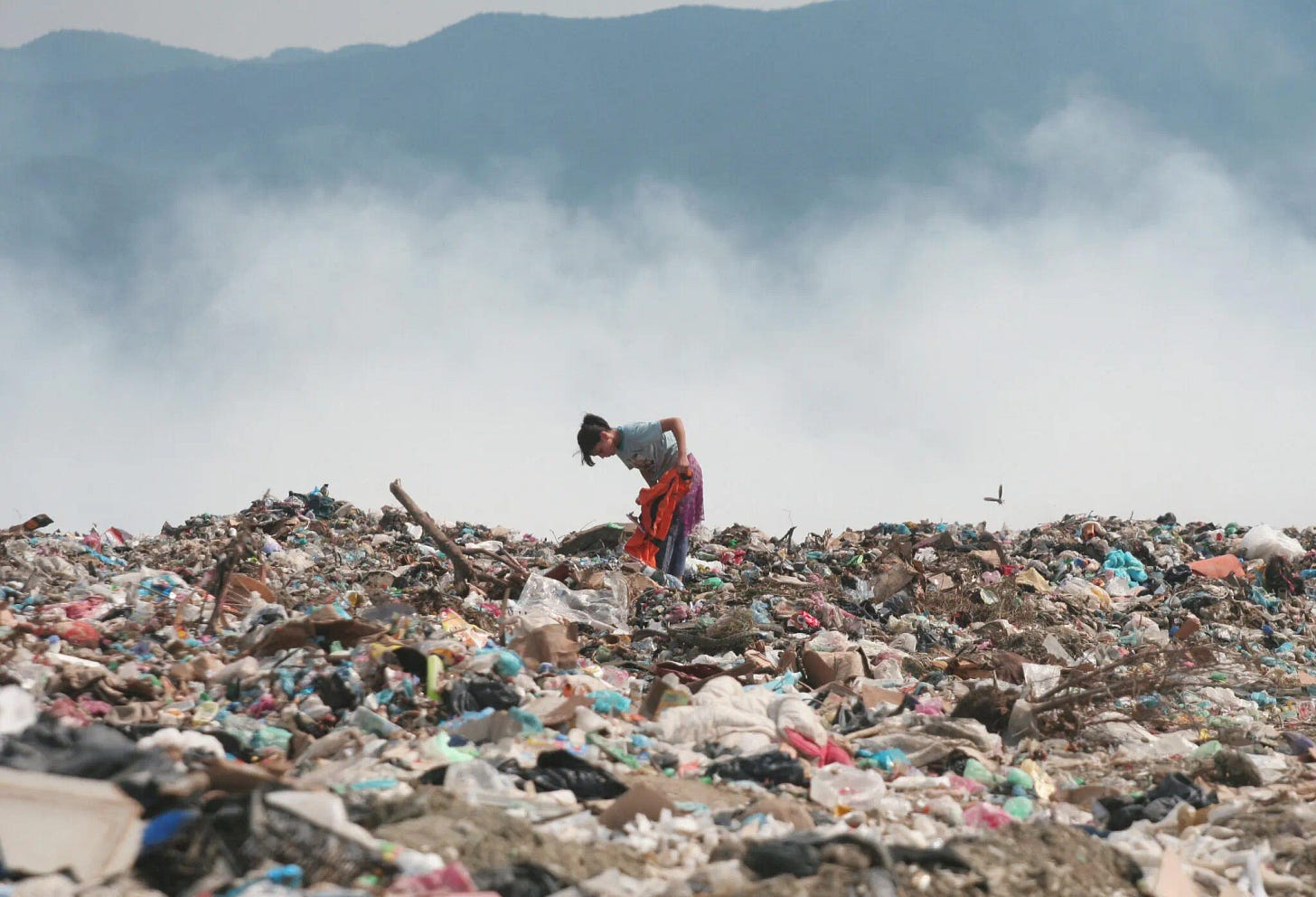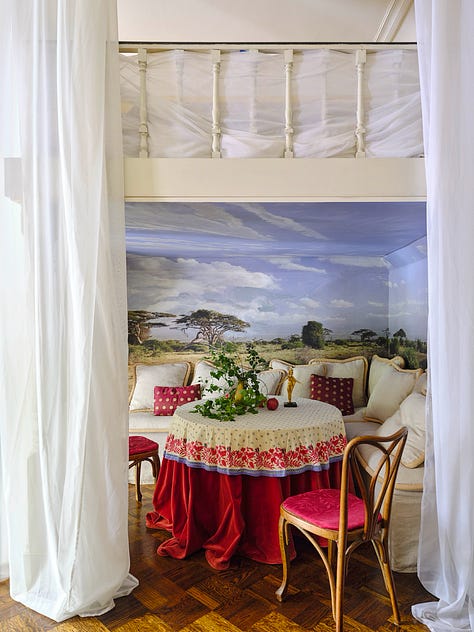“The Intersection” is your Monday, Wednesday, and Friday briefing on global affairs, business, culture, and design— helping you learn about the world through the lenses of sustainable development, women-centered perspectives, and emerging global trends.
Morning!
I stayed up way too late last night researching and writing this newsletter. There are so many stories and ideas to read and ponder, and once I start, I end up going down many rabbit holes. Honestly, that is my absolute favourite thing to do. While my brain always chooses to go to sleep over doing the dishes, it has almost no self-control when it comes to deciding between reading one more article and sleeping. I do, however, have a batch of Moon Juice’s Magensi-Om being delivered today, so I’m curious if that will help.
I was nearly winding down last night when I got pulled into reading about Biden’s visit to Angola earlier this month—the only sub-Saharan Africa stop of his presidency and the first U.S. president to visit the region since 2015. Likely his final overseas trip before leaving office, the focus was an 800-mile railway project, the Lobito Corridor, aimed at boosting U.S. economic ties in Africa. The project (somewhat) counters China’s Belt and Road Initiative, though Angola remains heavily indebted to China, with over $42 billion owed, the most of any African nation.
The U.S.-backed Lobito Corridor connects Angola’s border with the Democratic Republic of Congo to Lobito on the Atlantic Ocean. President Biden emphasized its potential to integrate Angola’s economy with regional markets like Zambia while also offering the U.S. greater access to critical minerals such as copper and cobalt—essential for manufacturing batteries in phones, electric vehicles, and other technologies.
Biden’s commitment to infrastructure development is one of the greatest legacies of his administration. I feel that the general public has overlooked it over the past four years.
What a crazy month for geopolitical bingo. Who had a successful Syrian revolution on their card? Or martial law in South Korea? Or, a world-class-worthy-of-Shakespeare political drama in Ottawa? - Politico
Chrystia Freeland Steps Down. Canadian Prime Minister Justin Trudeau’s Finance Minister, Chrystia Freeland, abruptly resigned from his Cabinet on Monday. In her resignation letter, shared on X, she wrote: "You and I have found ourselves at odds"—pointing to their disagreements on handling incoming President Donald Trump’s tariff threats. (I also think I read somewhere that he joked with Trudeau about Canada becoming the 51st state...not a funny joke.)
EU Pledges $1 Billion to Support Syrian Refugees. European Commission President Ursula von der Leyen has announced an additional $1 billion in aid to support Syrian refugees in Turkey. The pledge came during her meeting with Turkish President Recep Tayyip Erdogan on Tuesday, emphasizing the EU’s continued partnership with Ankara on migration. Turkey is host to approximately 3.2 million Syrian refugees, though some have begun returning to Syria following the recent political shift marked by the fall of President Bashar al-Assad. When people talk about the number of refugees in countries, they often forget that Turkey is the world’s largest refugee-hosting country and that the majority of refugees are hosted in countries that are neighboring their countries of origin.
Sudan Faces Deepening Humanitarian Crisis. The World Food Programme (WFP) is intensifying emergency operations in Sudan amid escalating conflict. Over 800,000 people in famine-affected and high-risk areas have received crucial food aid in recent weeks, but the humanitarian situation remains dire. More than 1.7 million Sudanese face famine or its imminent threat as violence between the Sudanese Armed Forces (SAF) and the paramilitary Rapid Support Forces (RSF) shows no signs of easing. While Sudan continues to grapple with one of the world’s most complex humanitarian crises, it seems as though it is often forgotten when it comes to headlines. However, the situation there is absolutely dire.
North Korean Troops Report First Casualties in Ukraine Conflict. Reports in October indicated that North Korea deployed around 10,000 troops to support Russia’s war effort in Ukraine. Over the weekend, the first casualties among these soldiers were reported in Russia’s Kursk border region. Many see North Korea’s involvement as an escalation—drawing another nation into the protracted and volatile conflict. It also makes you think that maybe Putin is running out of his own citizens to draft.
Ireland Responds to ICJ Case, Israel Closes Dublin Embassy. Following Ireland’s decision to join South Africa’s International Court of Justice (ICJ) case accusing Israel of committing genocide in Gaza, Israel has responded by closing its embassy in Dublin. Ireland has been vocal in its support for the Palestinians, and in May, it joined Spain and Norway in officially recognizing the state of Palestine. Irish Taoiseach Simon Harris emphasized his government’s position, stating: "I utterly reject the assertion that Ireland is anti-Israel. Ireland is pro-peace, pro-human rights, and pro-international law. Ireland wants a two-state solution and for Israel and Palestine to live in peace and security. Ireland will always speak up for human rights and international law. Nothing will distract that."

Mexico’s Judicial Gamble. Mexico is set to break new ground in judicial governance next year, becoming the first nation to elect all judges—local, high-ranking, and Supreme Court—by popular vote. The reform, passed in September by the Morena-controlled Senate, is touted by the ruling party as a bold step towards greater transparency and accountability in a judicial system long criticized for corruption, nepotism, and susceptibility to both political and criminal coercion. While the initiative has been lauded in some quarters, detractors—ranging from members of the legal fraternity to international observers—warn of significant risks. They argue that an elected judiciary could undermine the courts' independence, leaving judges vulnerable to cartel influence and diminishing their capacity to act as a check on government power.
The debate touches on a deeper question: should judges remain insulated from public sentiment, or does democratic participation strengthen the justice system? It's a question that resonates globally, particularly at a time when trust in the judiciary is under scrutiny. Consider the United States, where public frustration with the Supreme Court has grown amid decisions that appear misaligned with the majority will.
Yet, there’s a counterargument to be made: voters don’t always act in their own best interests, and access to accurate, impartial information is often limited. Could popular elections genuinely enhance judicial independence, or would they simply swap one set of pressures for another? The Mexican decision will undoubtedly be one to watch—not just for its impact on judicial integrity but also for what it reveals about the evolving relationship between democracy and governance.
Jingle Bells and Hydrogen Fuel Cells. ZeroAvia has earned accolades this year, including Time’s Top American Greentech Company and the USPTO's Patents for Humanity Green Energy Program award. Specializing in hydrogen-electric engines for aircraft, the firm aims to revolutionize zero-emission aviation. Milestones include the world’s first hydrogen-powered flight of a six-seater in 2019 and the 2023 debut of a 19-seat Dornier 228. Using hydrogen and oxygen to produce electricity with only water and heat as by-products, ZeroAvia already boasts 2,000 pre-orders from major global airlines.
Postcard Cabins Joins the Marriott Family. Postcard Cabins—formerly known as Getaway—has officially been acquired by Marriott, signaling a new chapter for the unique nature-focused retreat brand. Operating 29 outposts across the United States, Postcard Cabins offers minimalist, modern lodges that promise an escape from the daily grind, allowing guests to reconnect with nature. Founded a decade ago, the company boasts an impressive track record: over 600 wedding proposals, nearly 100,000 stays with dogs, and 2.4 million guests. These cabins, all located within a couple of hours’ drive from cities, are known for their large windows that seamlessly frame nature views and their clever lockboxes to leave your phone behind.
Their marketing is so effective that we stayed in one ourselves for a recent birthday celebration—and the experience was nothing short of magical. Now that Marriott has taken the helm, the question looms: Will this acquisition maintain the brand’s unique ethos and spirit, or will it risk losing the very charm that made it beloved? Only time will tell, but the hope is that this new ownership will preserve the seamless blend of simplicity and serenity that Postcard Cabins is celebrated for. This also seems to mark an industry shift to focus on outdoor accommodations. I’m keeping my eyes open for any other similar businesses that pop up. Do you know of any?
Add Sake to Your N/A Bar Cart. Origami Sake has announced its new alcohol-free sake, ZERO, the first non-alcoholic sake in the US. The company, which is based in Arkansas, uses 100% Arkansas-grown rice varieties and is the largest domestically owned sake brewery in the U.S. Apparently, the founders are on a mission to make their state “the Napa Valley of sake.” You can find where to buy their products here.
Brussels Struggles in the Winter Gloom. Since the start of December, Brussels has clocked just six hours and 11 minutes of sunshine—a stat that feels gloomy and bone-chilling, even from halfway around the world. Here’s hoping residents are doubling up on their vitamin D gummies and adding light therapy lamps to their Christmas wish lists.

Albania’s Hidden Recycling Industry. Due to discrimination, Romani and Egyptians in Albania have few employment opportunities outside of picking through the trash for recyclables. A 2011 law declared all waste in municipal bins the property of local governments, rendering this practice illegal, even though proper recycling systems remain absent. This story in Sapiens offers a fascinating look into the lives of these recyclers who operate without formal systems or protections and navigate hazardous conditions to access resources that reduce waste and contribute to economic survival. I also learnt that organized crime is involved in garbage management worldwide. An eye-opening read.
Who does garbage belong to? Who is responsible for recycling? How can waste pickers be legally integrated into the circular economy? And what happens when people turn their backs on their trash—and the people who process it?
3D Weaving Looks to Revolutionize Fashion. Unspun is looking to change the future of fashion through its innovative 3D weaving technology. Their automated on-demand production model, powered by the Vega™ system, is a circular loom that weaves yarn into tubes instead of flat sheets, therefore eliminating waste in the cutting process. By producing apparel with minimal lead time and localized production, they aim to reduce transportation emissions and address the overproduction and inefficient manufacturing processes that cause textile waste. I LOVE learning about solutions that are looking to decrease textile waste from being created rather than solely focusing on what to do with it once it has already been made.
Many Natural Perfume Options. The Good Trade team reviewed 12 natural perfume brands for nontoxic fragrances, and their favourite was the New Zealand brand Abel, which is new to me. I am considering ordering a couple of minis. There are a number of brands on the list that I had not heard of, which is exciting because, in 2025, we do not want random gunk in our scents.
Sustainability Takes a Backseat in State of Fashion 2025 Report. The Business of Fashion and McKinsey & Company’s State of Fashion 2025 report indicates that sustainability may lose its priority in the coming years. While it has been a top focus for industry leaders over the past couple of years, in 2025, a constrained growth environment has executives prioritizing brand differentiation and innovation over sustainability. The report suggests that, despite past momentum, economic pressures are reshaping industry priorities. I’ll share more insights as I dive deeper into the full 154 pages (!!!).
Tokyo’s Four-Day Workweek: A Baby Boom Experiment. Japan has one of the biggest fertility crises in the developed world, with a fertility rate at an all-time low, a population that declines every year, and the second-longest life expectancy in the world. The Japanese government is desperate to increase the country’s birth rates. So, Tokyo’s city government is trying something new to encourage a baby boom - a four-day workweek. The idea is that by giving employees more time off, they will be able to better balance work-life priorities, reduce stress, and have more time to support parenting and family planning. Additionally, a four-day workweek can mean childcare is slightly less expensive and daunting. While it may convince some families, personally, I don’t think that another day off will solve the much bigger issues that underline why so many people are choosing not to bring children into this world.
Medical Milestone. Pioneering surgery has allowed a 53-year-old grandmother from Alabama to receive a kidney from a new kind of genetically modified pig. Wow. That is all I have to say.
Gloria Steinem’s Home. I have found my dream home design thanks to Arch Digest’s feature of Gloria Steinem’s home. A feminist, activist, and writer who also has oodles of style? A We, Renaissance Women icon for sure. In the interview, she says, “What I think of is how important it is for women to be able to have a home without necessarily having children or a husband. A home of our own.”




Gloria Steinem’s home via Architectural Digest
And that is all for today! Stay curious and let me know what you are reading/learning about in the comments.
Much love,
Jennifer
xxx











